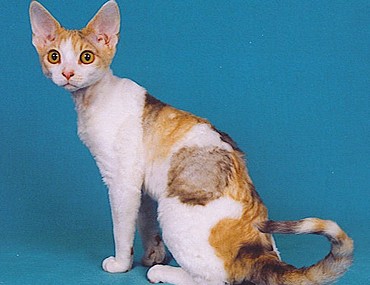History
A cousin of the Cornish Rex, the first Devon Rex was a feral kitten named Kirlee who was found pouncing around an abandoned tin mine in the county of Devon in the UK. And, like the Cornish Rex, the Devon Rex is friendly, outgoing, and unbelievably playful!
Actually, because of their similar coats, the first Devon was thought to be a Cornish Rex. However, genetic testing proved otherwise. Also, there are some notable differences in appearance between the Cornish and Devon Rex. The Cornish has a uniformly wavy coat, while the
Devon Rex has tight curls. Also, the ears of the Devon are big but set low in his head, whereas the ears of the Cornish are set high on his head.
Imported to the United States in the late 1960s, the Devon Rex is one of the most popular breeds of cat in America.
Cat Facts
There’s a lot to know about the Devon Rex:
- The term “Rex” refers to the Cornish’s unusually curly coat. Why Rex, though? The term came into fashion when King Albert I of Belgium entered some curly haired rabbits in a rabbit show. They didn’t meet breed standard, but afraid to anger the king, the judges accepted the rabbits and wrote “Rex” (Latin for king) next to the names of the rabbits on the score sheets.
- The Devon Rex is said to resemble a pixie because of his big ears, big eyes, and playful personality.
- Weight: 5-10 pounds

What are they like?
There are few cats friendlier than the Devon Rex. His enthusiasm for life is unmatched, and he loves to be in the middle of everything and absorb attention like a sponge. The Devon is smart, acrobatic, and clownish, meaning he loves to play and is hard to outsmart. Able to amuse and entertain himself for hours, he loves to play fetch!
The Devon Rex gets along really well with other animals and children, and he is both a great travel companion because of his adaptability and a great therapy cat because he loves to be held and touched.
The Devon Rex is a very hardy, well-muscled breed of cat with just a few known health issues:
- Hypertrophic cardiomyopathy, a form of heart disease
- Hereditary myopathy, which affects muscle function
- Patellar luxation
- Sunburns due to lack of hair
Right for you?
If a Devon Rex sounds like fun, you’re right! But there are always a few things to consider when welcoming a new pet into your home. Here are some things to consider:
- The Devon Rex is NOT hypoallergenic. If you have allergies, these cats can aggravate them because they produce dander, or dead skin cells (although no cat is better or worse than others for people with allergies).
- The Devon Rex’s coat requires very little grooming. In fact, it’s better if you stay away from brushing a Devon Rex’s coat most of the time, as the fine hairs are delicate and can be damaged. Occasional baths are really all the Devon Rex needs.
- The Devon Rex’s love for attention can make them a bit demanding at times. They don’t like to be alone for long, so if you work long hours or your family isn’t around much, it’s best to get a companion for a Devon.
- Sunburns! Leaving a Devon outside for long periods of time can lead to nasty sunburns because of a lack of hair. If you’re looking for a purely outdoor cat, look elsewhere.
If you have any questions or concerns, you should always visit or call your veterinarian – they are your best resource to ensure the health and well-being of your pets.
